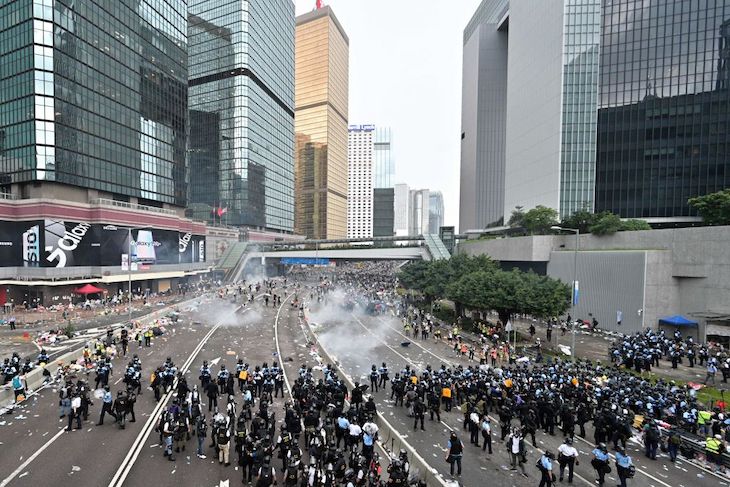Hong Kong
As it was five years ago during the Umbrella Movement, Hong Kong’s legislature is under siege by angry protestors. The government, itching to get a controversial extradition law on the books has, at least temporarily, been thwarted. This follows an extraordinary demonstration on Sunday when more than a million people flooded the streets here – the biggest demonstration there’s ever been in Hong Kong. Britain’s population is roughly nine times bigger than that of Hong Kong, so for a sense of the scale of it, just imagine if nine million people took to the streets of London. The protest was against government plans to change Hong Kong’s extradition laws so that Beijing will be able to get its hands on suspects who, as matters stand, cannot be rendered across the border. The obvious fear is that opposition figures will be the first to go, but the business world has also been unnerved as the mighty hand of the Chinese state shows no hesitation in swooping down on even prominent corporate titans. If the legislation is passed it would mean the end of the right to a free and fair trial; the end of the guarantee of an independent judiciary operating on common law lines. Instead, Hong Kong people could find themselves standing in front of Mainland judges, who are under specific orders to not consider the ‘Western’ concept of judicial independence. It’s a chilling thought because practically everyone who appears in a Chinese court is found guilty. Hong Kong’s British masters bequeathed only minimal democracy to their colony but they did install the rule of law, which occupies a place of reverence here akin to the British faith in the NHS. This reverence is absolutely understandable in a society largely populated by families originating from China, where they lived in fear of the ‘knock on the door’ at midnight. If the authorities come for you in China, there’s no hope of redress. What you hear, time and time again from the demonstrators is that if the rule of law is undermined, there will be no stopping the demolition of other safeguards guaranteeing Hong Kong’s autonomy, supposedly secured under a Sino-British treaty and embodied in the territory’s mini-constitution. The last time anything even approaching this number of people took to the streets here was back in 1989, on the morning after the massacre of protestors in Beijing’s Tiananmen Square. The fear and anger back then was for their compatriots on the Mainland, this time it’s very much for themselves. The Hong Kong government seems to be acting as little more than a delivery agent for the wishes of Beijing. The Hong Kong marchers come from every age group and from an impressive cross-section of Hong Kong society: well heeled business types march alongside the tenants of the ubiquitous public housing estates. I saw a virtually paralysed man propel himself along on a wheeled contraption; there were fathers carrying babies perched in slings on their backs. Many said that they had never before even contemplated taking to the streets. There’s now talk of strikes, class boycotts and businesses are closing their doors in protest. The strong feeling here is that this is Hong Kong’s only and last chance to prevent a horrible slide backwards into Chinese control. The new extradition legislation is being propelled through the legislature at breakneck speed and it’s pretty much guaranteed to pass because the expulsions of legislators has weakened the presence of the opposition. Rules have been changed to reduce scrutiny of bills and in the last round of elections, candidates were screened out for their political views. Worse: the first ban on a political party has been imposed and there are plans to step up political ‘education’ in schools. Another new law promising strict punishments for disrespecting the national anthem is on the stocks and immigration officers routinely block entry to people known for opposition views and, for the first time, a foreign correspondent has been expelled. Hong Kong was supposed to be different. It was promised a high degree of autonomy: one country, two systems. But the Chinese dictatorship has never really been comfortable with any kind of duality. Presiding over this rapid dwindling of Hong Kong’s autonomy is a curiously Theresa May-like figure, Carrie Lam, the Chief Executive, who like May, runs the territory in name only and shares her charisma deficit. Anger with Lam is rife on the streets, but the real power lies in a severe looking office building innocuously called the Liaison Office. Its tall iron gates open only to selected visitors and its telephone lines buzz as Mainland officials issue ‘guidance’ to legislators, government officials and all manner of other functionaries. The Liaison Office has tried to mobilise support for the new law, but in private even pro-government legislators admit to deep unease over what’s happening. For the moment, the vast majority of Hong Kong’s people have declared that the slide towards the Chinese dictatorship must stop.
Stephen Vines
The attack on Hong Kong’s democracy has been thwarted, for now





Comments